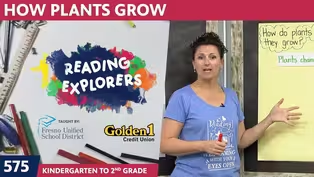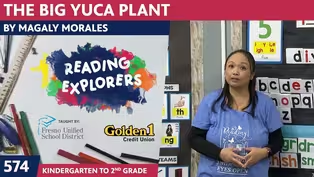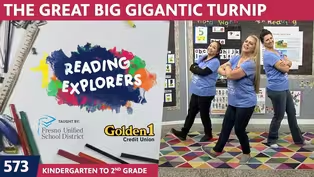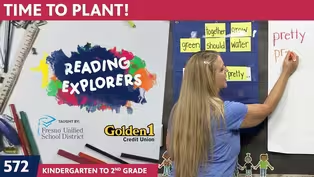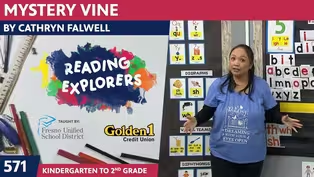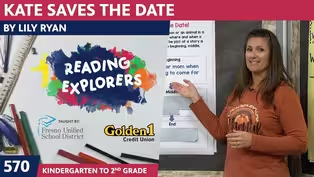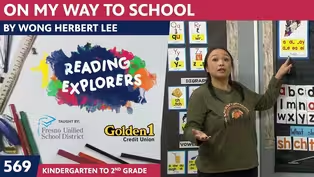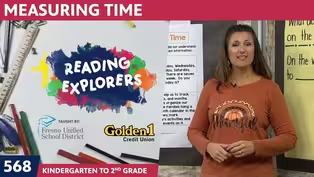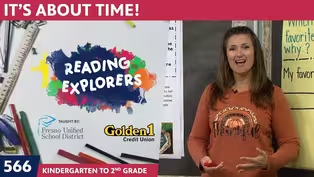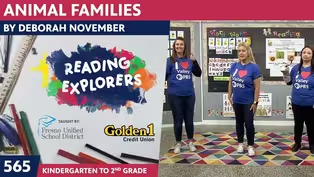
3-380: Practicing Vowel Teams
Season 3 Episode 455 | 14m 9sVideo has Closed Captions
Join Mrs. Nix at Camp Discovery!
Third Grade teacher, Mrs. Nix, welcomes students back to Camp Discovery, a fun learning space packed with reading adventures & fun games!
Problems playing video? | Closed Captioning Feedback
Problems playing video? | Closed Captioning Feedback
Reading Explorers is a local public television program presented by Valley PBS

3-380: Practicing Vowel Teams
Season 3 Episode 455 | 14m 9sVideo has Closed Captions
Third Grade teacher, Mrs. Nix, welcomes students back to Camp Discovery, a fun learning space packed with reading adventures & fun games!
Problems playing video? | Closed Captioning Feedback
How to Watch Reading Explorers
Reading Explorers is available to stream on pbs.org and the free PBS App, available on iPhone, Apple TV, Android TV, Android smartphones, Amazon Fire TV, Amazon Fire Tablet, Roku, Samsung Smart TV, and Vizio.
Providing Support for PBS.org
Learn Moreabout PBS online sponsorshipMore from This Collection
Valley PBS and Fresno Unified School District have partnered with Golden 1 Credit Union to create Reading Explorers Lessons for grades Pre-Kindergarten through Third grade. The daily lessons will be taught by Fresno Unified School District teachers and are created to help students practice their reading skills and reinforce lessons during distance learning.
Video has Closed Captions
Learn about the life cycle of a plant on Reading Explorers. (26m 39s)
K-2-574: The Big Yuca Plant by Magaly Morales
Video has Closed Captions
Join the Reading Explorers as we adventure into a new book The Big Yuca Plant. (26m 30s)
K-2-573: The Great Big Gigantic Turnip
Video has Closed Captions
What will happen at The Great Big Gigantic Turnip? (26m 30s)
K-2-571: Mystery Vine by Cathryn Falwell
Video has Closed Captions
The Bell has rung and the Valley PBS Classroom is open once more. (26m 32s)
K-2-570: Kate Saves The Date by Lily Ryan
Video has Closed Captions
Mrs. Nix, Mrs. Hammack and Mrs. Vang are glad to have you join her for a new day. (26m 32s)
K-2-569: On My Way To School by Wong Herbert Lee
Video has Closed Captions
Mrs. Vang is ready for a new day of phonemic awareness and reading comprehension. (26m 40s)
Video has Closed Captions
We review phonics, frequency words and more on Reading Explorers. (26m 45s)
K-2-567: Nate The Snake Is Late
Video has Closed Captions
What happens when Nate the Snake is late to school? (26m 49s)
Video has Closed Captions
It's time for school! How do you know what time it is? (26m 31s)
K-2-565: Animal Families by Deborah November
Video has Closed Captions
Welcome to the Reading Explorers lessons in the Valley PBS Classroom. (26m 14s)
K-2-564: From Caterpillar To Butterfly
Video has Closed Captions
The transformation from Caterpillar to Butterfly is a special one. (26m 52s)
Providing Support for PBS.org
Learn Moreabout PBS online sponsorship♪ Good morning to a brand new day ♪ ♪ Time to learn and games to play ♪ ♪ Learning things is so much fun ♪ ♪ Learning is good for everyone ♪ (upbeat music) - Good morning, third graders.
My name is Mrs. Nix, and I am so excited to be here on this Friday to support you to become amazing thinkers, readers, and writers.
And so, as we are getting ready for our exciting weekend, I'm thinking to myself, "Hmm, what am I going to read?"
I need to go down and check something out.
Maybe I'm gonna go to the county library.
Maybe I'm gonna stop by one of the school libraries and check something out.
Or maybe I'm gonna just hang out at home, get on my phone, and use the app Sora to check out a book.
What are you gonna do?
Speaking of Sora, I always love, we're to that point in the week where we get to see which school checked out the most books in Fresno Unified using the Sora app.
So let's take a look and see who it is.
Are you ready?
Heaton Elementary!
Great job Heaton!
We are so impressed.
So keep up the amazing work that you are doing.
Now, speaking of that amazing work, if you're reading some fantastic books, I would love to hear what books you are reading.
And I'd love to be able to give you a little shout out here at PBS.
So you're gonna see an address, it's gonna pop up on the screen, jot that down, write me a letter, let me know what is it that you've been reading or learning, maybe it's even just something you're looking forward to doing this summer.
I'd love to hear it.
And if you do that and include your return address, I'll put one of these activity books in the mail for free to you.
All right.
Just don't forget to include your return address so I can make sure it gets to you.
You ready to start today?
We have two things, third grade that we're gonna go through and visit.
We're gonna talk about those vowel-team syllables and finish off with those Greek and Latin roots.
And I've got a whole bunch of them that we've been working on all week long and we're going to finish out strong.
I know you can do it.
Okay.
Let's warm up those brains.
It's early.
Let's look at those high frequency words that we've been reading all week and practice them in a couple of sentences.
Come join me.
Here we go.
Read them together.
Got, green, had, has, grow, have, hold, hot, hurt, and how.
Awesome!
I love when we come to Friday and I get to pull out my favorite color right here, purple.
Yay!
Let's look at our two words.
We've got hurt, H-U-R-T, and how, H-O-W. All right.
Let's use them in a couple of sentences.
Do you know hmm to ride a bike?
And she hmm her arm when she fell.
Ooh, she fell.
If she fell, what happened to her?
She probably got hurt.
That was a great clue word for us.
She hurt her arm when she fell.
And how about this one?
Do you know how to ride a bike?
Do you know how to ride a bike?
Oh, so much fun, especially now that the weather's getting warm and we can be outside and ride our bikes.
How fun?
Okay.
So let's get started.
We've got those vowel-team syllables.
We've talked about them this week.
Why are we learning them?
Well, it's gonna help us to become better readers and writers, because we're gonna be able to decode those big long words.
And as we're moving into fourth grade, 'cause that's what we're getting ready for, we want to make sure that we're able to take those big long words and chunk them out so that we can read them.
And it makes it so that we can understand more what we're reading, right?
Okay.
I've got a couple of reminders, just to remember, every syllable in a word has one vowel sound, one vowel sound.
We don't want to be tripped up and thinking that it has one vowel, it has a vowel sound.
And that's really important when we're talking about our vowel-teams, because vowel-teams are two or more letters working together in a word to form one vowel sound.
So looking up here, you're gonna see that there's pairs of vowels.
You're gonna see a vowel paired with a consonant, such as y or you'll see over here, there's a w. So remember, that when you see these, and there's more of them, I just put a few up here to kind of jog your memory, but when you see them paired together, they make that single vowel sound.
Think of that, oi saying oi.
Think of that ow saying, ow or ow, like in bow or cow.
Remember, it makes all those different sounds.
So we want to make sure that we're remembering those as we go through and are looking.
So here's what we're gonna do, we're gonna practice it.
I've got a little bit of practice here.
We're looking for those vowel-teams, so help me out.
When I'm looking, oh, this one has an ie, so I see there's one vowel-team.
And then I'm looking for any other vowels.
Okay.
I've got another vowel-team, oi says oi, right?
So I know how many syllables are gonna be in this word.
Two of them, because each syllable only has one vowel sound.
Here's a vowel sound.
Here's a vowel sound.
And I know that I'm gonna have, view is gonna be my first syllable, view.
And I can see the word here, point, viewpoint, I simply have two syllables.
Good.
Okay.
So let's go through and let's look at preheated, preheated.
Ooh.
We're gonna see several syllables here.
So let's look.
So we've got the e in pre, we've got, here's a vowel-team, ea.
And then I've got a vowel over here for my suffix of ed, okay?
Preheated.
Okay.
So how many syllables am I going to have?
Three.
That's right.
So I know that the ed is gonna stick by itself and pre is gonna stick to itself, 'cause those are kind of my prefixes and suffixes.
That's almost an easy way of looking at it.
Got pre-heat-ed, preheated.
We've got three.
Good job.
Okay.
My last little bit, before we get into looking at some practice, is let's talk about and review some of these Greek and Latin roots that we've been practicing this week.
So we've done astro and aster, which means star or outer space.
And again, you might have these in your, in a notebook that you've been practicing your word steady notebook.
Thinking about what are some words that have these roots.
Think about photo, that it means light.
So you want to write that one down.
Graph is something written.
And tele means far, okay?
So put those all in a book so that you can start to study those and learn about those and think about some of the words that you could use.
Today, we're gonna practice the root, graph, and graph means something written.
Now I have two words here.
I have paragraphs and autograph, and I'm gonna just kind of put them in here so we can look at them for a second.
And then we're gonna match them up with their definition.
So autograph, you can see I'm gonna just slip this in here.
Here's my root, graph.
And in paragraph, it's a little bit trickier to see, 'cause it's kind of there in the middle.
Do you see it right like that?
So see there's graph in the middle.
Okay.
So when I'm thinking about paragraphs, paragraphs, well, let me look at my options here.
Is it a person's signature?
A paragraph?
Hmm, no.
So I know that that's in the wrong spot.
How about this, a group of written sentences that are indented?
Yes!
That's what a paragraph is.
It's a group of written sentences.
How about this one?
A person's signature is their autograph.
It's their autograph.
So auto means self, and graph means written.
So that's a great way to practice some of those Greek and Latin roots.
Now, speaking of practice, what does it look like when we go through and we want to practice some of those.
Okay.
Thinking about going back to those vowel teams.
So I've got some examples that are written up here just to remind us what they are.
But remember, every syllable has one vowel sound.
Okay.
We're looking for vowel-teams though.
Do we see any, we've got two words right here, complain and happen.
Ooh, I didn't read the instructions.
What am I doing with these?
Well, let's look.
Read each word pair.
Circle the word with a vowel-team syllable and divide the words that you circled by writing the syllables on the lines.
Okay, here we go.
Complain and happen.
Which one has that vowel-team?
You got it.
Complain has it, right here.
Okay.
How do we divide it?
Com-plain, where we've got two vowels, so I'm gonna have two syllables, com and plain.
Excellent job.
How about repeats and travels?
I guess I should circle that 'cause that was what my directions were.
Repeats and travels.
Okay.
Repeats has the vowel-team, so this is the word we're gonna divide.
And how many syllables am I gonna have?
Well, I've got two vowel sounds, re and peats.
So re and peats will be our second syllable.
Excellent.
So I have several more that are written up here.
It's a great chance for you to go through and practice them.
I want to skip down and I want to do a little bit of practice with our Greek and Latin roots, remembering that we've been practicing astro, graph, photo, and tele.
So let's go through and it says, read each sentence.
Circle the word that has the Greek or Latin root.
Okay.
So let's look.
We're going to be detectives here.
So the famous astronaut talked about her space flight.
Do you see the word with that Greek or Latin root?
Ooh, right here.
Astronaut.
What was the root that was used?
Astro.
Do we remember what astro was?
Star or outer space.
Good job.
He used the telescope to view the animals in the distance.
Excellent.
Telescope has that tele.
Fantastic!
Now, I have several more sentences but I think I'm gonna let you practice those at home, 'cause I would love to finish out our Friday talking about some of those additional Greek and Latin roots.
So we've got or, fin, orb, cid, mir, we've talked about these this week, so if you've been jotting those down in your notebook, you'll have some meanings for them.
Today, we're going to be looking at orb, orb.
An orb means circle.
Okay.
So when I'm thinking about circle, okay, somethings making a circle.
Okay.
Let's look at the word, the word is orbit, orbit.
Hmm.
I'm familiar with the word but let me think about what that really means.
Okay.
So, he was the first American to orbit Earth.
Ooh.
What do you think orbit means?
It has to do with the circle.
So let's look at some choices.
Does it mean to stop suddenly?
No.
Does it mean to go around something in a circle?
Ooh, that sounds really promising.
Does it mean to live a long and happy life?
No.
It's right here.
Orbit means to go around something in a circle.
So you see how knowing that root can help us understand what it means?
Awesome job.
Hey, third grade, it's been a fantastic week learning with you and supporting you.
I just want to remind you that you are responsible for your learning success.
So listen, ask questions and share your ideas because together, we can do so much more.
I hope you have a fantastic weekend.
I look forward to seeing you back here at PBS on Monday.
I want you to stay safe, have fun, and I'll see you then.
Take care.
Bye bye.
(instrumental music) ♪ Good morning to a brand new day ♪ ♪ Time to learn and games to play ♪ ♪ Learning things is so much fun.
♪ ♪ Learning is good for everyone ♪
Support for PBS provided by:
Reading Explorers is a local public television program presented by Valley PBS
